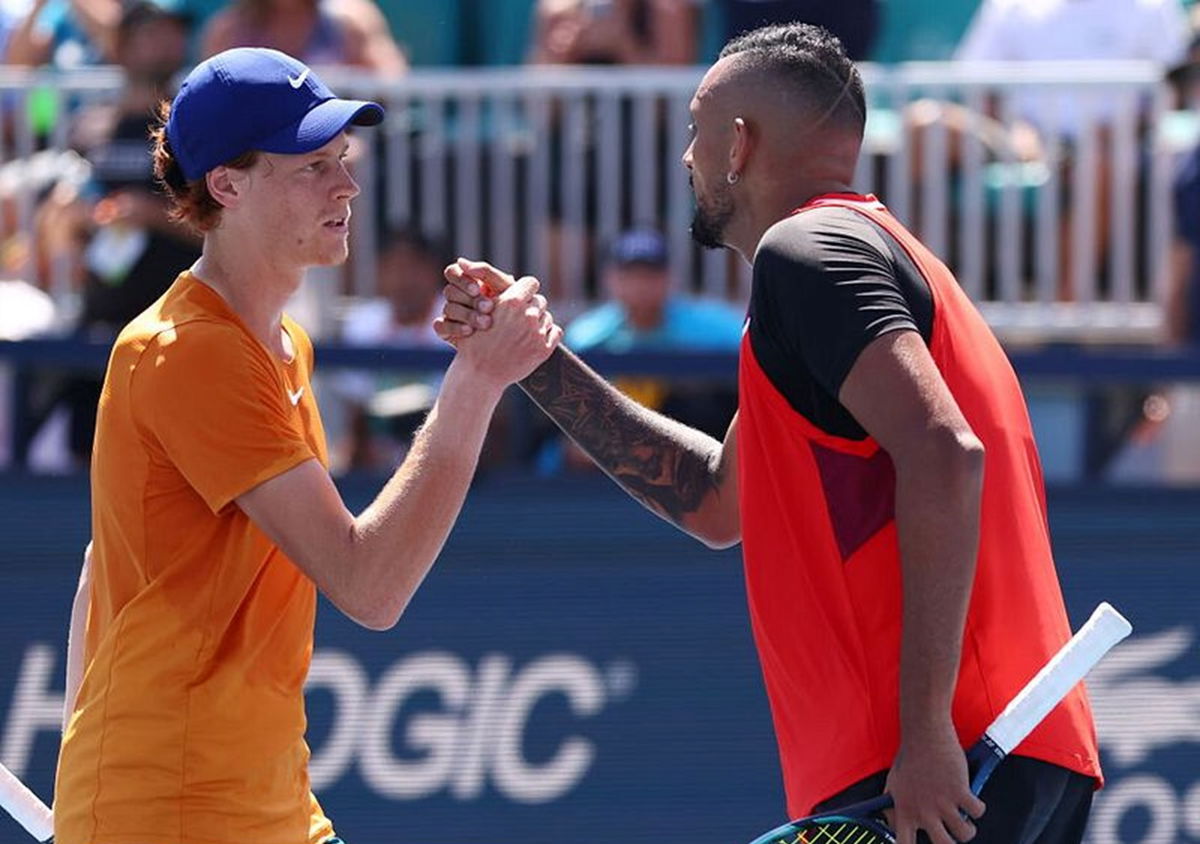

Nick Kyrgios is all set to step foot on the glorious courts of Melbourne after a two-year-long hiatus. The 29-year-old is in the spotlight amid his ongoing beef with world no.1, Jannik sinner. The latter was involved in controversies for testing positive twice for a banned substance back in March 2024. Ahead of the first major tournament of the season, Nick couldn’t stop himself from making a cheeky comment, criticizing the favoritism he thinks Sinner is privileged with. Here’s all about the latest chapter in this already-heated feud.
Watch What’s Trending Now!
Jannik Sinner has been at the center of a doping controversy since August 2024. The ITIA revealed that Sinner tested positive for clostebol, a banned anabolic steroid, in March of 2024. This news shocked the tennis community, as the violation occurred during Indian Wells, one of the sport’s most eminent tournaments. The ITIA charged Sinner under Article 2.1 and Article 2.2 of the Tennis Anti-Doping Programme, which prohibits the use and presence of banned substances in a player’s system.
However, Sinner’s provisional suspensions were lifted after rapid hearings. He submitted evidence, including receipts and testimony to support his version of the incident, which was that his physio applied a spray containing clostebol to treat his own wound and then gave him a massage without gloves, causing the contamination.
ADVERTISEMENT
Although these quick decisions allowed Sinner to continue playing, criticism still hasn’t stopped coming his way. Never one to shy away, Nick Kyrgios, recently triggered by Sinner’s closed-door hearing at CAS, posted on X, “At least we know it’s behind closed doors this time 😭😂 this is all so shady haha.” Later he added, “Why is it behind closed doors? If you did nothing wrong, then let us have the transparency.”
Why is it behind closed doors? If you did nothing wrong then let us have the transparency 🤷🏽♂️
— Nicholas Kyrgios (@NickKyrgios) January 10, 2025
Earlier, Nick had called the Jannik Sinner development “ridiculous” and demanded the world No. 1 be suspended “for 2 years” after he failed multiple drug tests. Now many other players have voiced their concerns about the fairness of the process. Denis Shapovalov shared his frustration, tweeting, “Different rules for different players”.
ADVERTISEMENT
Shapovalov later told the website Tennis Majors that his comment wasn’t directed at Sinner, but at an anti-doping process that has not given other players the same benefit and quick attention that Sinner got from ITIA. The British player Tara Moore, who was charged with an anti-doping violation later shown to be caused by contamination that took far longer to wind its way through, joined the chorus, as did her companion Liam Broady. “Whether Sinner was doping or not, this is not right,” Broady took on social media. “Plenty of players go through the same thing and have to wait months or years for their innocence to be declared. Not a good look.”
Sinner addressed the controversy openly, saying, “I have nothing to hide.” He expressed disappointment with WADA’s decision to appeal, stating, “There have been three separate hearings confirming my innocence.” Sinner assured full cooperation, adding, “I understand these things need to be thoroughly investigated to maintain the integrity of the sport we all love.”
ADVERTISEMENT
The Professional Tennis Players Association (PTPA) criticized the ITIA’s handling of the case, calling its processes “broken”. The ITIA defended its work, stating, “Our investigators work according to the rules, with respect and reflecting our values.” As the tennis world waits for the appeal hearing, Sinner’s case continues to spark debate. It raises questions about transparency, fairness, and the anti-doping system’s consistency.
ITIA CEO clarifies the potential risks in Jannik Sinner’s doping case
Karen Moorhouse, the CEO of the International Tennis Integrity Agency (ITIA), provided insights into the potential consequences Jannik Sinner might face if found guilty. Speaking to Tennis365, she explained how doping violations are assessed and penalized under current rules. “If you test positive for a prohibited substance, the starting point for a possible disqualification is four years,” she said. “If it can be proven that it was not intentional, the sentence is reduced to two years. At this point, some differentiations must be made”.
ADVERTISEMENT
Moorhouse highlighted the distinction between Sinner’s case and others, such as Iga Swiatek’s. “In the case of Swiatek, we are talking about a contaminated product (medicine), while for Sinner there is the complication that he is an uncontaminated product, as the physiotherapist used the product in question that contained the doping active ingredient on his finger. For this reason, the interval of disqualification goes from one to two years,” she added. This significant difference could be critical as CAS reviews WADA’s appeal and decides Sinner’s fate.
While Sinner’s team has presented strong evidence of accidental contamination, including testimony and supporting documents, the principle of strict liability in doping cases appears large. Under this principle, athletes are held accountable regardless of intent. WADA’s decision to pursue an appeal indicates they believe there is sufficient basis to challenge the ITIA’s earlier ruling. With CAS set to deliver a verdict after the Australian Open, the stakes for Sinner—and for tennis—could not be higher.
Top Stories
Naomi Osaka and Antonia Ruzic Refuse to Continue Australian Open Match- Here’s What Happened

Jannik Sinner Wins Hearts With Class Act After Opponent Retires Following On-Court Fall at Australian Open

Commentator’s Disturbing Novak Djokovic Remark During Australian Open Clash Turns Heads

Coco Gauff Shares Honest Take on Players Changing Nationality at Australian Open: “There’s Obvious Reasons”

Iga Swiatek Goes Rogue After Skirt Hinders Tough Clash at Australian Open

ADVERTISEMENT
ADVERTISEMENT
ADVERTISEMENT